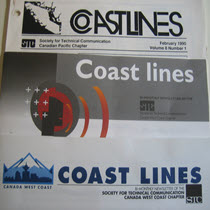Our monthly newsletter, Coast Lines, started out as a printed magazine. Some members recall driving to collect boxes of several hundred finished issues from a print shop and then stuffing and sealing envelopes, applying address labels and postage stamps by hand, and dropping the packages at the post office for delivery. Ah, the good old days.
Today, Coast Lines has evolved into an email newsletter, distributed by free subscription. The chapter also communicates worldwide via Twitter, LinkedIn, and our website.
Technical communication has come a long way since STC Canada West Coast started in 1979 — or has it? A look back at old issues of Coast Lines reveals that some articles are quaintly outdated, while others are surprisingly predictive of the tools and techniques we use today. Some are sad reminders that things don’t always change for the better. Here are some highlights from the archives.
Some things change…
An article in the Spring 1994 issue discussed “Communicating in the Age of the Jetsons,” referring to a futuristic TV series that ran in 1962/63 and was briefly revived in 1985. It urged readers to leave behind “the dark ages of typewriters, carbon [paper], Dictaphone and telex machines to embrace voice recognition computers, online documentation, electronic file transfers, email, internal fax modems, notebook computers, and wireless communications.” Many of today’s readers have grown up with those newfangled tools and might need to look up the antiquated terms. Luckily, the answers are now readily available on your phone.
In Sept./Oct. 2002, postal mail was still recommended as a good way to contact potential employers and clients. “Marketing Your Tech Writing Business” suggested this, along with phone calls (“if you reach voice mail, leave a message”), email, and fax. In 2019, it’s common to send an email to schedule a phone call, rather than cold-calling, or to find new contacts at networking events.
In Jan./Feb. 2003, an article began “How high-tech! At our October meeting we connected via computer to [a speaker in] Boston, MA….” This was big news in 2003 but in 2019 many of our meetings, whether educational presentations or chapter volunteer meetings, are conducted via web conferencing software.
That same article admonished: “Face it. the Internet has changed the way we write.” This is no longer cutting-edge news.
Some stay the same…
Feb. 1990 announced a presentation on stress management — still a problem today, with staff cuts, deadlines, and increasingly complex technology to deal with.
That issue also provided tips on planning for changes in technology, project scope, and market demands, all of which are still challenging us in 2019.
In Spring 1994, the cover story enthusiastically introduced a new concept to technical writers in “ISO 9000 — Opportunity Knocks!” These international quality standards, first published in 1987, are still in widespread use today.
Some are sadly missed
Back when chapter membership numbered several hundred, we had an almost endless supply of volunteers helping the chapter thrive. The Jan./Feb. 2001 issue listed 36 of them, Sept./Oct. 2002 showed 62! Today, a small but dedicated group of people are doing multiple jobs to keep things going. (If you’d like to help, let us know.)
The old days were a more innocent time, before spammers were such a widespread blight. Those lists of volunteers included a phone number and email address for each of them. Jan./Feb. 2001 also printed the names (though not contact info) of 27 new members.
Writing standards were higher then. The Spring 1994 issue bemoaned the misuse of quotation marks for emphasis (in an ad for “a ‘new and improved’ product”). In 2019, some bloggers and even the BBC agonize over the death of written language itself, as emojis threaten to replace words.
Note: Our collection of Coast Lines back issues is incomplete. Do you have an old printed issue you’d like to share? We’d be happy to add it to our archives or scan it and return it you. We might even feature it in an upcoming article.
This article is one of a series that looks back at our chapter’s history and accomplishments over 40 years.


Happy 40th to Coast Lines in all its iterations.
Pam: You’re part of the chapter’s history, too! Thank you for your years of service as well as the good wishes. 🙂
Heather